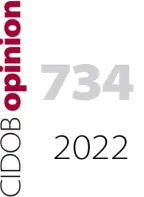Matteo Garavoglia

Associate Senior Researcher
Dr. Matteo Garavoglia is Research Associate at the Department of Politics and International Relations of the University of Oxford, Senior Research Associate at the Barcelona Centre for International Affairs (CIDOB), Adjunct Professor at the Hertie School of Governance in Berlin and Senior Fellow and Director at the European Movement International in Brussels. He leads the European Public Sphere Project: a research effort engaging top-level movers and shakers from business, media and politics to develop targeted policy-oriented proposals aimed at Europeanizing national public spheres.
Previously, he was the Italy Program Fellow at the Brookings Institution’s Centre on the United States and Europe in Washington D.C. He also served as Adjunct Professor at Johns Hopkins University's Paul H. Nitze School of Advanced International Studies, as Visiting Professor at Bocconi University in Milan, as Research Fellow at the Centre d’Etudes Européennes de Sciences Po in Paris and as Research Assistant at the London School of Economics and Political Science. Dr. Garavoglia has been teaching or speaking at, amongst others, Harvard University, Princeton University, Columbia University and Georgetown University. His work has been published or quoted by, amongst others, the Edmund A. Walsh School of Foreign Service, National Interest, the Atlantic, Voice of America, ABC News, NBC News, National Public Radio, China Global Television Network, Bloomberg, Fortune, the Washington Post, Al Jazeera, Politico, Deutsche Welle, CNN, Foreign Policy and Foreign Affairs. He was educated at the University of London (BA), at the Centre d’études européennes de Sciences Po Paris (MA), and at the Freie Universität Berlin (PhD). Dr. Garavoglia lived in twelve different countries across four continents and speaks Italian, English, Spanish, French and some German.
